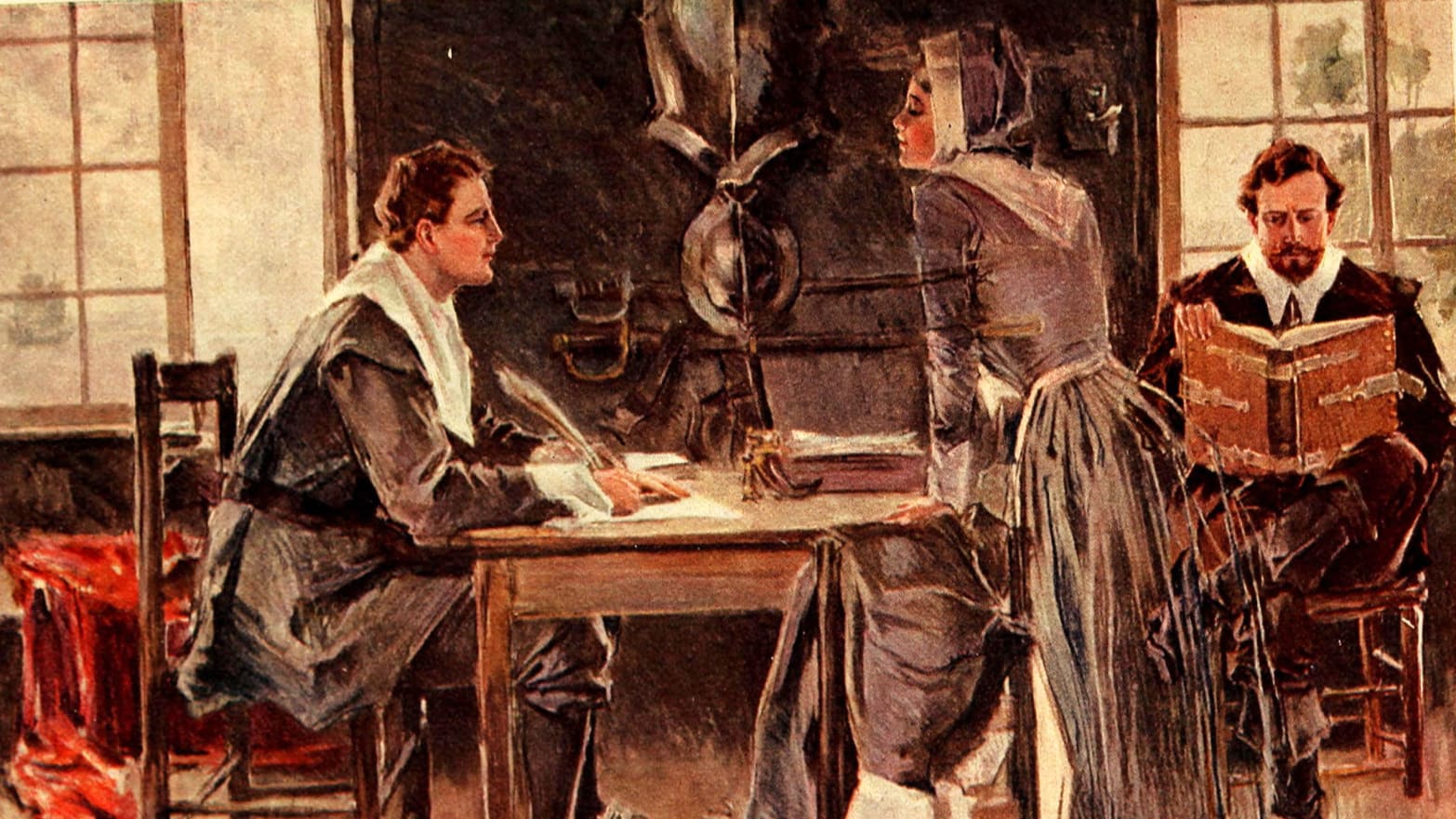Chandler and Joey, Bert and Ernie… Miles Standish and John Alden. We are talking, of course, of the rich history of fictional roommates, if by “rich” we really mean, “huh, there aren’t a lot of them, are there?”
But you know what else there isn’t a lot of? Notable fictional creations pertaining to Thanksgiving, though the poet Henry Wadsworth Longfellow made a dogged—and lucrative—attempt to countervail that set of circumstances when he immortalized the above Puritan duo in a poem—about a love triangle, nonetheless—that still stands as our most notable Thanksgiving-related creation. But should it?
Longfellow had a unique career, and you can make a case that he’s done more harm than good with many of the readers who have encountered him since he composed his narrative poem The Courtship of Miles Standish 160 years ago in 1858. What Longfellow liked to do was read widely, then synthesize, borrowing European poetic forms and giving his American readers some juicy poetical tales loaded with heroic couplets.
The poems were quite sing-songy, and those European forms made you feel smart, like you were a member of the intelligentsia of an upstart country. It’s a bit like when we’re in the classier store at the strip mall now, and Mozart’s Greatest Hits is playing on the sound system, and you think, “Right, I am pretty damn cultured in this moment, as I ponder the purchase of these stemless wine glasses.”
A writer as vituperative as Edgar Allan Poe positively kissed Longfellow’s ass, and if you’ve ever read Poe’s criticism, that will throw you for a loop. Said kissing was in part because Poe admired Longfellow for the amounts of money he could rake in with his poems, some of which generated fees of $3,000. Now, I’m no fiduciary historian, but three grand in 1858 must have been a sum you could have bought a couple houses with.
Longfellow was easily the country’s most famous poet, a celebrity writer whose works were akin to what the latest singles by Elvis and the Beatles would later be. History has bashed him about though, as someone who distorted events for a good rhyme, and as a slight writer whose works are piffle and which could never have aged well. We might think of him now as a kind of poet’s version of Nathaniel Philbrick, but a poorer man’s one. Philbrick is a historian who reads the books of the past, it feels like, so that you don’t have to (ah, our sad indolence) and then cobbles together the best parts for his highly readable narratives. At least with him, he’s not making anything up.
We have come to a point in the demise of education when it’s not uncommon for me to meet someone who has never heard of Paul Revere, but those who have almost always know Longfellow’s canonizing poem about the silversmith, with it’s open invite of “Listen, my children, and you shall hear / Of the midnight ride of Paul Revere.” (It is said that Beastie Boys fans know something of this, too.)
Why was Revere the star of this poem? Because of the easy rhyme. Paul Revere was a lot of things—and foremost among them he was an artist—but he was not a master night-rider, as it turns out, and was picked up by the British before he reached Concord, though his horse-mate Dr. Prescott managed to get through. But what rhymes with Prescott? Wainscot? The pioneer of wall paneling?
Longfellow gave no 19th century fucks, though, so Paul Revere got the star turn. The same idea plays out in The Courtship of Miles Standish, but with a few different wrinkles that earn our respect.
There is a lot of heroic honor on display in the poem. Standish and his roommate Alden both love Priscilla Mullins, as well they should—she was the only single Pilgrim of marrying age. It was that or the cattle. No, wait, that’s wrong. But it’s not far off. She was also strong-minded, and enjoyed tweaking both of her suitors; clearly they were going to have to earn it.
The problem with this take on history is that Standish is one of your all-time classic nut jobs. If he was a hockey player, he’d log over 300 penalty minutes a year and always be getting suspended. This dude lost his shit with the best of them. But what is true is that the Pilgrims, whom you might have thought of as an uptight lot, did love a love story, and if it was kind of a proto-threesome, they still loved it. They were romantics, which you had to have been, no matter how grounded you were—or steeped in your faith in God—if you undertook what they undertook. You were, even if things worked out the best that they could have, committing to some real loss, pain, tragedy. Respect, right?
Something to think about at Thanksgiving as you’re grinding through a family dinner. Or maybe if you’re alone, for whatever reason, wishing you were not, hoping the next year will give you cause for something different. When we think that way, we are creatures of faith, and while I am not here to salute the glory of Longfellow’s poetics (“Down to the Plymouth rock, that had been to their feet as a door-step / Into a world unknown—the corner stone of a nation!”; ugh), I respect where he was coming from with this poem.
As it opens, we see that Standish is this barrel-chested, athletic fellow, the big man on the Pilgrim campus. Only problem is, he struggles with words, which limits his ability to woo. Enter, then, roommate Alden, the go-between who gets besotted with love for Mullins himself. Alden is a scholar, Standish a warrior type who already lost a wife. Big problem, though, is that he thinks it’s a matter of biblical course of action that Mullins should be Mrs. Miles Standish #2. Alden sees the pain his buddy is in, and despite not really agreeing with the whole “God decrees it!” perspective, he walks on up to the fair Priscilla and asks if she’ll marry his roomie.
There’s a lot of swooning in this language, declarations of friendship in rosy, verbose terms, but there’s nothing mealy-mouthed about Alden’s blunt query. It’s almost like a code conveyed via impatience, as if to say, “Look, my boy is into you, but can you see I’m dying here, busting with love, baby girl?” Okay—leave out the baby girl part. Have a guess who gets the girl? And yet, the title of the poem is what it is, a fascinating misdirection that parallels the fascinating misdirections that make up the life guts of life itself. So it goes with me, with you, and so it went with Longfellow, too.
Living in Boston, I often walk over a bridge that spans the banks of what is sometimes known here, thanks to the Standells, as the River Charles. This is the Longfellow Bridge, so named because Henry himself walked over this stretch of widening river many times in the past.
In mid-September 1841, Longfellow married Mary Storer Potter. She was his childhood friend, and their connection was deep. He struggled to get his career going, but others provided for him, even if he was pretty much just imitating Washington Irving. The president of Harvard offered him a job, for which he and his wife would leave their Maine home and come to Cambridge, provided that Longfellow broaden his knowledge of languages, and this meant a trip to Europe to study. It was there that Mary, who was six months pregnant, died.
A portion of Longfellow did as well. He was unable to compose. Alone, he came to Cambridge, lived in the former headquarters of George Washington, wrote his ass off, and eventually he was ready to try to meet someone again. This turned out to be Fanny Appleton, daughter of a wealthy Beacon Hill industrialist. If you’re not from Boston, you perhaps might not know that Beacon Hill is the tony—very tony—blue-blooded neighborhood—much the same now as it was then—that abuts the Charles on the Boston side of the river. It’s about three miles away from Harvard. What Longfellow did for seven years, until Fanny agreed to marry him, was walk across that bridge from Harvard, and walk back again.
Longfellow did a lot of other things. He was good friends with Hawthorne and Emerson. Sometimes the latter would tell him that he wasted too much time writing crap. He translated the Divine Comedy, and owning Longfellow’s version of Dante became a status symbol thing for aspirant American families. He favored the abolition of slavery, penning a fairly tepid volume of poems on the subject, which weren’t as fiery as one would like to see, but hey, he was doing a lot more than others were, which warrants some kind of credit, even if a limited one.
He was rich, he was loved, but he knew pain. In the summer of 1861, after they’d been married for about 15 years, Longfellow rushed into a room where Fanny had been putting the locks of their children’s hair into envelopes, sealing them with hot wax. The wax got on her dress, and she caught fire. Longfellow, who had been napping, threw his body upon his wife to try to put out the flames. Too late. The doctor came, she was put to bed. The next morning, she requested a bracing cup of coffee, and died.
Longfellow’s face was badly burned, so he grew the beard that was as famous in its time as that of Abraham Lincoln’s. He drank a lot of laudanum and worried that he would become insane. He was, in most ways, an entirely broken man.
Of course, the composition of The Courtship of Miles Standish predates that second tragedy, but as I read it again, it reads like the work of a man who’d throw himself upon hell fires for something he believed in or someone he loved, which is why I think he de-tyranted Standish.
Not for the rhyme, not for the easy sale, not for the glory. I think he wished to be in communion, to break mental and spiritual bread, with people who loved, like he would love, and was loving, and would, in a fashion, continue to do so when he continued on later.
I think that’s a very nice Thanksgiving thought. And if we have a national Thanksgiving poem, then let it be a work felt deeply, if rendered somewhat crudely. It’s like your relatives when you see them at the holiday, and maybe some have had a few too many pops, and it’s time to opine about politics, or what you ought to do differently in your life. They’re a bit much, but they love you. So it goes with a writer like Longfellow.

